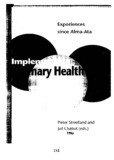Empowerment through health education: the approach of an NGO in Bangladesh
Date
1990Publisher
CIP-Gegevens Koninklijke BibliotheekAuthor
Chowdhury, AMRMetadata
Show full item recordCitation
Chowdhury, A. (1990). Empowerment through health education: the approach of an NGO in Bangladesh. In Implementing primary health care: experiences since Alma-Ata (pp. 113–120). Den Haag: CIP-Gegevens Koninklijke Bibliotheek.Abstract
The paper describes a health programme in Bangladesh which is distinct in many respects. Instead of providing curative services, the programme is educational; it works with the community in raising awareness, empowers people through transfer of knowledge and technology, creates demand for health care and services, and activates the existing service system to cater to this increased demand. Following a review of past health activities in Bangladesh, the paper discusses the details of the programme and looks at the organization that carries it out. As one of the largest indigenous non-governmental development organizations in the developing world, the Bangladesh Rural Advancement Committee (BRAC), is implementing primary health care (PHC) via a staff of more than 3000 men and women in thousands of villages. After trying to introduce a comprehensive form of PHC which did not succeed because it proved impossible to realize equitable care in the villages due to large differences in power and income, the organization became involved in large-scale selective programmes, especially promoting oral rehydration therapy. BRAC is still pursuing this approach, whilst also trying once again to further a more comprehensive form of PHC.

